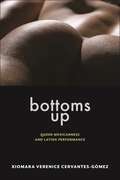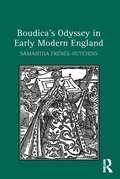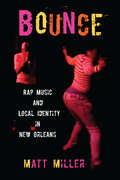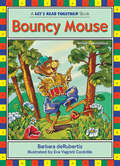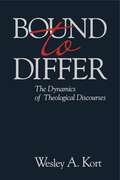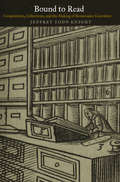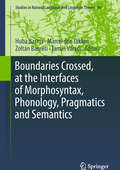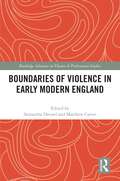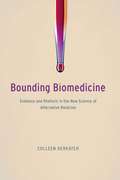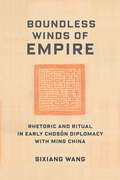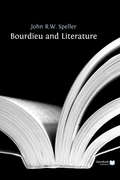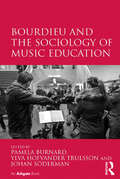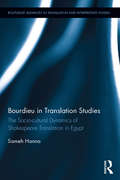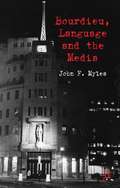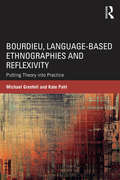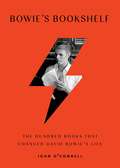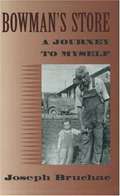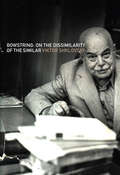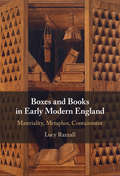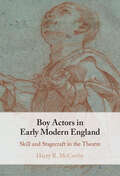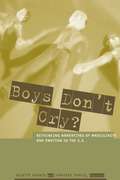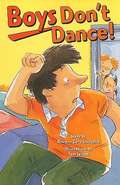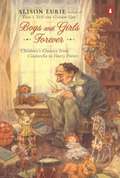- Table View
- List View
Bottoms Up: Queer Mexicanness and Latinx Performance (Sexual Cultures)
by Xiomara Verenice Cervantes-GomezProposes a queer way to be in the world and with othersInvoking queer aesthetics, ethics, and politics, Bottoms Up explores a sexual way to be with others while living with loss. Xiomara Cervantes-Gómez demonstrates how aesthetic representations of sex—namely, bottoming—function as allegorical paradigms, revealing the assemblages of violence that have constituted the social, cultural, and political shifts of Mexico and US Latinx culture from 1950 to the present.With playful, theoretically nuanced prose, Cervantes-Gómez builds upon queer of color theory and continental philosophy to present the “bottom” as a form of relational performance, which she terms “pasivo ethics.” The argument develops through a series of compelling case studies, including a series of novels by Octavio Paz and Luis Zapata that trace the position of the bottom in Mexican nationalist literature; the forms of exposure, risk, and proximity in the performance work of artist Lechedevirgen Trimegisto; a reading of violence and the erotic in the work of artist Bruno Ramri; and reading artists such as Yosimar Reyes, Yanina Orellana, and Carlos Martiel as they build a framework of sexual inheritance that carries the traumas of Mexicanness into the diaspora.Through a broad archive rooted in hemispheric Latinx performance, Bottoms Up considers how sexual and political power are bound up with each other in the shaping of Mexicanness. Placing particular emphasis on questions of queer and trans Mexican embodiment, the book explains how Mexicanness is constituted through discourses of exposure.
Boudica's Odyssey in Early Modern England
by Samantha Frénée-HutchinsThis diachronic study of Boudica serves as a sourcebook of references to Boudica in the early modern period and gives an overview of the ways in which her story was processed and exploited by the different players of the times who wanted to give credence and support to their own belief systems. The author examines the different apparatus of state ideology which processed the social, religious and political representations of Boudica for public absorption and helped form the popular myth we have of Boudica today. By exploring images of the Briton warrior queen across two reigns which witnessed an act of political union and a move from English female rule (under Elizabeth I) to British/Scottish masculine rule (under James VI & I) the author conducts a critical cartography of the ways in which gender, colonialism and nationalism crystallised around this crucial historical figure. Concentrating on the original transmission and reception of the ancient texts the author analyses the historical works of Hector Boece, Raphael Holinshed and William Camden as well as the canonical literary figures of Edmund Spenser, William Shakespeare and John Fletcher. She also looks at aspects of other primary sources not covered in previous scholarship, such as Humphrey Llwyd’s Breuiary of Britayne (1573), Petruccio Ubaldini’s Le Vite delle donne illustri, del regno d’Inghilterra, e del regno di Scotia (1588) and Edmund Bolton’s Nero Caesar (1624). Furthermore, she incorporates archaeological research relating to Boudica.
Bounce: Rap Music and Local Identity in New Orleans
by Matt MillerOver the course of the twentieth century, African Americans in New Orleans helped define the genres of jazz, rhythm and blues, soul, and funk. In recent decades, younger generations of New Orleanians have created a rich and dynamic local rap scene, which has revolved around a dance-oriented style called "bounce." Hip-hop has been the latest conduit for a "New Orleans sound" that lies at the heart of many of the city's best-known contributions to earlier popular music genres. Bounce, while globally connected and constantly evolving, reflects an enduring cultural continuity that reaches back and builds on the city's rich musical and cultural traditions. In this book, the popular music scholar and filmmaker Matt Miller explores the ways in which participants in New Orleans's hip-hop scene have collectively established, contested, and revised a distinctive style of rap that exists at the intersection of deeply rooted vernacular music traditions and the modern, globalized economy of commercial popular music. Like other forms of grassroots expressive culture in the city, New Orleans rap is a site of intense aesthetic and economic competition that reflects the creativity and resilience of the city's poor and working-class African Americans.
Bouncy Mouse: Vowel Combinations Oi, Ou (Let's Read Together ®)
by Barbara deRubertisLet&’s Read Together books merge rhyme and vowel sounds in delightfully zany stories kids will want to read again and again. Each of the 15 books in this classic series by award-winning author/educator Barbara deRubertis will give your child a jumpstart on reading success."Story lines are silly and inventive, and recall Dr. Seuss&’s Cat in the Hat for the building of rhythm and rhyming words." —School Library JournalBouncy Mouse bothers his Dad, until his noisy musical antics lead to stardom! (This easy-to-read story features the "oi" and "ou" vowel combinations.)
Bound to Differ: The Dynamics of Theological Discourses (G - Reference, Information and Interdisciplinary Subjects)
by Wesley A. KortIn this analysis of theological conflict, Wesley Kort treats theologies as discourses that generate power and significance by their relations to and differences from one another. He identifies the traditional or putative claims of theological power and meaning—sources, referents, and patterns or structures—as distractions from or even concealments of the discursive situation in which theologies arise.Kort first describes the dynamics of difference and conflicts constituted by theologies and the importance of power for opposing theologies. He provides a model that demonstrates why differences and conflicts, rather than occasional or peripheral effects of theology, are required as central causes. He then applies the analysis and model in the task of reading theologies of more than a dozen modern and contemporary figures.In his conclusion, Kort returns to the cultural situation he sketched at the beginning, one that creates the conditions for the study and that is often called "postmodern." Kort calls it "a culture of scripture and belief," and he discusses prospects for theology in a culture not characterized by the fact and certainty. "The culture of scripture and belief" calls for theologies that are both forceful and vulnerable to critique.
Bound to Read: Compilations, Collections, and the Making of Renaissance Literature (Material Texts)
by Jeffrey Todd KnightConcealed in rows of carefully restored volumes in rare book libraries is a history of the patterns of book collecting and compilation that shaped the literature of the English Renaissance. In this early period of print, before the introduction of commercial binding, most published literary texts did not stand on shelves in discrete, standardized units. They were issued in loose sheets or temporarily stitched—leaving it to the purchaser or retailer to collect, configure, and bind them. In Bound to Read, Jeffrey Todd Knight excavates this culture of compilation—of binding and mixing texts, authors, and genres into single volumes—and sheds light on a practice that not only was pervasive but also defined the period's very ways of writing and thinking.Through a combination of archival research and literary criticism, Knight shows how Renaissance conceptions of imaginative writing were inextricable from the material assembly of texts. While scholars have long identified an early modern tendency to borrow and redeploy texts, Bound to Read reveals that these strategies of imitation and appropriation were rooted in concrete ways of engaging with books. Knight uncovers surprising juxtapositions such as handwritten sonnets collected with established poetry in print and literary masterpieces bound with liturgical texts and pamphlets. By examining works by Shakespeare, Spenser, Montaigne, and others, he dispels the notion of literary texts as static or closed, and instead demonstrates how the unsettled conventions of early print culture fostered an idea of books as interactive and malleable.Though firmly rooted in Renaissance culture, Knight's carefully calibrated arguments also push forward to the digital present—engaging with the modern library archives where these works were rebound and remade, and showing how the custodianship of literary artifacts shapes our canons, chronologies, and contemporary interpretative practices.
Boundaries Crossed, at the Interfaces of Morphosyntax, Phonology, Pragmatics and Semantics (Studies in Natural Language and Linguistic Theory #94)
by Marcel Den Dikken Huba Bartos Zoltán Bánréti Tamás VáradiThis volume offers a selection of interface studies in generative linguistics, a valuable “one-stop shopping” opportunity for readers interested in the ways in which the various modules of linguistic analysis intersect and interact. The boundaries between the lexicon and morphophonology, between morphology and syntax, between morphosyntax and meaning, and between morphosyntax and phonology are all being crossed in this volume. Though its focus is on theoretical approaches, experimental studies are also included. The empirical focus of many of the contributions is on Hungarian, and several chapters respond to work published by István Kenesei, to whom the volume is dedicated.
Boundaries of Violence in Early Modern England (Routledge Advances in Theatre & Performance Studies)
by Matthew Carter Samantha DresselThis book explores the possibilities and limitations of violence on the Early Modern stage and in the Early Modern world. This collection is divided into three sections: History-cal Violence, (Un)Comic Violence, and Revenge Violence. This division allows scholars to easily find intertextual materials; comic violence may function similarly across multiple comedies but is vastly different from most tragic violence. While the source texts move beyond Shakespeare, this book follows the classic division of Shakespeare’s plays into history, comedy, and tragedy. Each section of the book contains one chapter engaging with modern dramatic practice along with several that take textual or historical approaches. This wide-ranging approach means that the book will be appropriate both for specialists in Early Modern violence who are looking across multiple perspectives, and for students or scholars researching texts or approaches.
Bounding Biomedicine: Evidence and Rhetoric in the New Science of Alternative Medicine
by Colleen DerkatchDuring the 1990s, an unprecedented number of Americans turned to complementary and alternative medicine (CAM), an umbrella term encompassing chiropractic, energy healing, herbal medicine, homeopathy, meditation, naturopathy, and traditional Chinese medicine. By 1997, nearly half the US population was seeking CAM, spending at least $27 billion out of pocket. Bounding Biomedicine centers on this boundary-changing era, looking at how consumer demand shook the health care hierarchy. Drawing on scholarship in rhetoric and science and technology studies, the book examines how the medical profession scrambled to maintain its position of privilege and prestige, even as its foothold appeared to be crumbling. Colleen Derkatch analyzes CAM-themed medical journals and related discourse to illustrate how members of the medical establishment applied Western standards of evaluation and peer review to test health practices that did not fit easily (or at all) within standard frameworks of medical research. And she shows that, despite many practitioners’ efforts to eliminate the boundaries between “regular” and “alternative,” this research on CAM and the forms of communication that surrounded it ultimately ended up creating an even greater division between what counts as safe, effective health care and what does not. At a time when debates over treatment choices have flared up again, Bounding Biomedicine gives us a possible blueprint for understanding how the medical establishment will react to this new era of therapeutic change.
Boundless Winds of Empire: Rhetoric and Ritual in Early Chosŏn Diplomacy with Ming China
by Sixiang WangFor more than two hundred years after its establishment in 1392, the Chosŏn dynasty of Korea enjoyed generally peaceful and stable relations with neighboring Ming China, which dwarfed it in size, population, and power. This remarkably long period of sustained peace was not an inevitable consequence of Chinese cultural and political ascendancy. In this book, Sixiang Wang demonstrates how Chosŏn political actors strategically deployed cultural practices, values, and narratives to carve out a place for Korea within the Ming imperial order.Boundless Winds of Empire is a cultural history of diplomacy that traces Chosŏn’s rhetorical and ritual engagement with China. Chosŏn drew on classical Chinese paradigms of statecraft, political legitimacy, and cultural achievement. It also paid regular tribute to the Ming court, where its envoys composed paeans to Ming imperial glory. Wang argues these acts were not straightforward affirmations of Ming domination; instead, they concealed a subtle and sophisticated strategy of diplomatic and cultural negotiation. He shows how Korea’s rulers and diplomats inserted Chosŏn into the Ming Empire’s legitimating strategies and established Korea as a stakeholder in a shared imperial tradition. Boundless Winds of Empire recasts a critical period of Sino-Korean relations through the Korean perspective, emphasizing Korean agency in the making of East Asian international relations.
Bourdieu and Literature
by John R.W. SpellerBourdieu and Literature is a wide-ranging, rigorous and accessible introduction to the relationship between Pierre Bourdieu's work and literary studies. It provides a comprehensive overview and critical assessment of his contributions to literary theory and his thinking about authors and literary works. <p><p> One of the foremost French intellectuals of the post-war era, Bourdieu has become a standard point of reference in the fields of anthropology, linguistics, art history, cultural studies, politics, and sociology, but his longstanding interest in literature has often been overlooked. This study explores the impact of literature on Bourdieu's intellectual itinerary, and how his literary understanding intersected with his sociological theory and thinking about cultural policy. <p> This is the first full-length study of Bourdieu's work on literature in English, and it provides an invaluable resource for students and scholars of literary studies, cultural theory and sociology.
Bourdieu and the Sociology of Music Education
by Pamela Burnard Ylva Hofvander TrulssonPierre Bourdieu has been an extraordinarily influential figure in the sociology of music. For over four decades, his concepts have helped to generate both empirical and theoretical interventions in the field of musical study. His impact on the sociology of music taste, in particular, has been profound, his ideas directly informing our understandings of how musical preferences reflect and reproduce inequalities between social classes, ethnic groups, and men and women. Bourdieu and the Sociology of Music Education draws together a group of international researchers, academics and artist-practitioners who offer a critical introduction and exploration of Pierre Bourdieu’s rich generative conceptual tools for advancing sociological views of music education. By employing perspectives from Bourdieu’s work on distinction and judgement and his conceptualisation of fields, habitus and capitals in relation to music education, contributing authors explore the ways in which Bourdieu’s work can be applied to music education as a means of linking school (institutional habitus) and learning, and curriculum and family (class habitus). The volume includes research perspectives and studies of how Bourdieu’s tools have been applied in industry and educational contexts, including the primary, secondary and higher music education sectors. The volume begins with an introduction to Bourdieu’s contribution to theory and methodology and then goes on to deal in detail with illustrative substantive studies. The concluding chapter is an extended essay that reflects on, and critiques, the application of Bourdieu’s work and examines the ways in which the studies contained in the volume advance understanding. The book contributes new perspectives to our understanding of Bourdieu’s tools across diverse settings and practices of music education.
Bourdieu in Translation Studies: The Socio-cultural Dynamics of Shakespeare Translation in Egypt (Routledge Advances in Translation and Interpreting Studies)
by Sameh HannaThis book explores the implications of Pierre Bourdieu’s sociology of cultural production for the study of translation as a socio-cultural activity. Bourdieu’s work has continued to inspire research on translation in the last few years, though without a detailed, large-scale investigation that tests the viability of his conceptual tools and methodological assumptions. With focus on the Arabic translations of Shakespeare’s tragedies in Egypt, this book offers a detailed analysis of the theory of ‘fields of cultural production’ with the purpose of providing a fresh perspective on the genesis and development of drama translation in Arabic. The different cases of the Arabic translations of Hamlet, Macbeth, King Lear and Othello lend themselves to sociological analysis, due to the complex socio-cultural dynamics that conditioned the translation decisions made by translators, theatre directors, actors/actresses and publishers. In challenging the mainstream history of Shakespeare translation into Arabic, which is mainly premised on the linguistic proximity between source and target texts, this book attempts a ‘social history’ of the ‘Arabic Shakespeare’ which takes as its foundational assumption the fact that translation is a socially-situated phenomenon that is only fully appreciated in its socio-cultural milieu. Through a detailed discussion of the production, dissemination and consumption of the Arabic translations of Shakespeare’s tragedies, Bourdieu in Translation Studies marks a significant contribution to both sociology of translation and the cultural history of modern Egypt.
Bourdieu, Language and the Media
by John F. MylesThis book engages with key theoretical and analytical issues in the field of media, communication and cultural studies. Using case studies of radio, internet, text messaging and photojournalism, it deploys Bourdieu's ideas to reveal how language in the media is implicated in broader social patterns of 'symbolic violence'.
Bourdieu, Language-based Ethnographies and Reflexivity: Putting Theory into Practice
by Kate Pahl Michael GrenfellOffering a unique and original perspective on Bourdieu, language-based ethnographies,and reflexivity, this volume provides a nuanced, in-depth discussion of the complex relationship between these interconnected topics and their impact in real-world contexts. Part I opens the book with an overview of the historical background and development of language-based ethnographic research and Bourdieu’s work in this space. Part II presents a series of case studies that highlight a Bourdieusian perspective and demonstrate how reflexivity impacts language-based ethnography. In each study, Bourdieu’s conceptual framework of reflexively-informed objectivity examines the ways in which the studies themselves were constructed and understood. Building on Parts I and II, the concluding set of chapters in Part III unpacks the messiness of the theory and practice of language-based ethnography, and provides insights into what reflexivity means for Bourdieu and in practical contexts. Arguing for a greater reflexive understanding in research practice, this volume sets an agenda for future literacy and language research.
Bowie's Bookshelf: The Hundred Books that Changed David Bowie's Life
by John O'ConnellNamed one of Entertainment Weekly&’s 12 biggest music memoirs this fall. &“An artful and wildly enthralling path for Bowie fans in particular and book lovers in general.&” —Publishers Weekly (starred review) &“The only art I&’ll ever study is stuff that I can steal from.&” ―David Bowie Three years before David Bowie died, he shared a list of 100 books that changed his life. His choices span fiction and nonfiction, literary and irreverent, and include timeless classics alongside eyebrow-raising obscurities.In 100 short essays, music journalist John O&’Connell studies each book on Bowie&’s list and contextualizes it in the artist&’s life and work. How did the power imbued in a single suit of armor in The Iliad impact a man who loved costumes, shifting identity, and the siren song of the alter-ego? How did The Gnostic Gospels inform Bowie&’s own hazy personal cosmology? How did the poems of T.S. Eliot and Frank O&’Hara, the fiction of Vladimir Nabokov and Anthony Burgess, the comics of The Beano and The Viz, and the groundbreaking politics of James Baldwin influence Bowie&’s lyrics, his sound, his artistic outlook? How did the 100 books on this list influence one of the most influential artists of a generation? Heartfelt, analytical, and totally original, Bowie&’s Bookshelf is one part epic reading guide and one part biography of a music legend.
Bowman's Store: A Journey to Myself
by Joseph BruchacThe author shares in this memoir how he came to fully understand, and eventually claim, his Native American heritage, despite his grandparents' unspoken pact to never discuss Grandpa's Abenaki blood.
Bowstring
by Viktor Shklovsky Shushan Avagyan"Myths do not flow through the pipes of history," writes Viktor Shklovsky, "they change and splinter, they contrast and refute one another. The similar turns out to be dissimilar." Published in Moscow in 1970 and appearing in English translation for the first time, Bowstring is a seminal work, in which Shklovsky redefines estrangement (ostranenie) as a device of the literary comparatist-the "person out of place," who has turned up in a period where he does not belong and who must search for meaning with a strained sensibility. As Shklovsky experiments with different genres, employing a technique of textual montage, he mixes autobiography, biography, memoir, history, and literary criticism in a book that boldly refutes mechanical repetition, mediocrity, and cultural parochialism in the name of art that dares to be different and innovative. Bowstring is a brilliant and provocative book that spares no one in its unapologetic project to free art from conventionality.
Bowstring
by Viktor Shklovsky Shushan Avagyan"Myths do not flow through the pipes of history," writes Viktor Shklovsky, "they change and splinter, they contrast and refute one another. The similar turns out to be dissimilar." Published in Moscow in 1970 and appearing in English translation for the first time, Bowstring is a seminal work, in which Shklovsky redefines estrangement (ostranenie) as a device of the literary comparatist-the "person out of place," who has turned up in a period where he does not belong and who must search for meaning with a strained sensibility. As Shklovsky experiments with different genres, employing a technique of textual montage, he mixes autobiography, biography, memoir, history, and literary criticism in a book that boldly refutes mechanical repetition, mediocrity, and cultural parochialism in the name of art that dares to be different and innovative. Bowstring is a brilliant and provocative book that spares no one in its unapologetic project to free art from conventionality.
Boxes and Books in Early Modern England: Materiality, Metaphor, Containment
by Lucy RazzallIn early modern England, boxes furnished minds as readily as they furnished rooms, shaping ideas about the challenges of interpretation, and negotiations of the book itself as text and material object. Engaging with recent work on material culture and the history of the book, Lucy Razzall weaves together close readings of texts and objects, from wills, plays, sermons and religious polemic, to chests, book-bindings, reliquaries and coffins. She demonstrates how the material and imaginative possibilities of the box were dynamically connected in post-Reformation England, structuring modes of thought. These early modern responses to materiality offer ways in which the discipline of book history might reframe its analysis of the material text. In tracing the early modern significance of the box as matter and metaphor, this book reveals the origins of some of the enduring habits of thought with which we still respond to people, texts and things.
Boy Actors in Early Modern England: Skill and Stagecraft in the Theatre
by Harry R. McCarthyBoy Actors in Early Modern England: Skill and Stagecraft in the Theatre provides a new approach to the study of early modern boy actors, offering a historical re-appraisal of these performers' physical skills in order to reassess their wide-reaching contribution to early modern theatrical culture. Ranging across drama performed from the 1580s to the 1630s by all-boy and adult companies alike, the book argues that the exuberant physicality fostered in boy performers across the early modern repertory shaped not only their own performances, but how and why plays were written for them in the first place. Harry R. McCarthy's ground-breaking approach to boy performance draws on detailed analysis of a wide range of plays, thorough interrogation of the cultural contexts in which they were written and performed, and present-day practice-based research, offering a critical reimagining of this important and unique facet of early modern theatrical culture.
Boys Don't Cry?: Rethinking Narratives of Masculinity and Emotion in the U.S.
by Jennifer Travis Milette ShamirWe take for granted the idea that white, middle-class, straight masculinity connotes total control of emotions, emotional inexpressivity, and emotional isolation. That men repress their feelings as they seek their fortunes in the competitive worlds of business and politics seems to be a given. This collection of essays by prominent literary and cultural critics rethinks such commonly held views by addressing the history and politics of emotion in prevailing narratives about masculinity. How did the story of the emotionally stifled U.S. male come into being? What are its political stakes? Will the "release" of straight, white, middle-class masculine emotion remake existing forms of power or reinforce them? This collection forcefully challenges our most entrenched ideas about male emotion. Through readings of works by Thoreau, Lowell, and W. E. B. Du Bois, and of twentieth century authors such as Hemingway and Kerouac, this book questions the persistence of the emotionally alienated male in narratives of white middle-class masculinity and addresses the political and social implications of male emotional release.
Boys Don't Dance! (Rigby PM Plus Blue (Levels 9-11), Fountas & Pinnell Select Collections Grade 3 Level Q)
by Tom Jellett Rowena LindquistLuke worries that his schoolmates might see him taking his sister to her dancing lesson. To his surprise, he finds that the class looks interesting and that dancing is fun.
Boys and Girls Forever
by Alison LurieIt often seems that the most gifted authors of books for children are not like other writers: instead, in some essential way, they are children themselves. E. Nesbit devoted weeks to building a toy town out of blocks and kitchenware. James Barrie spent his holidays playing pirates and Indians with the four Davies boys. Laurent deBrunhoff, who has continued his father's BABAR series for many years, is still climbing trees at the age of 70. Beatrix Potter preferred the company of animals and pets to that of eligible young dancing partners at balls. In these fascinating studies, Alison Lurie's subjects range from what fairy tales tell us, to children's games and poetry by and for children, from book illustrators to enchanted forests and secret gardens in children's literature.
